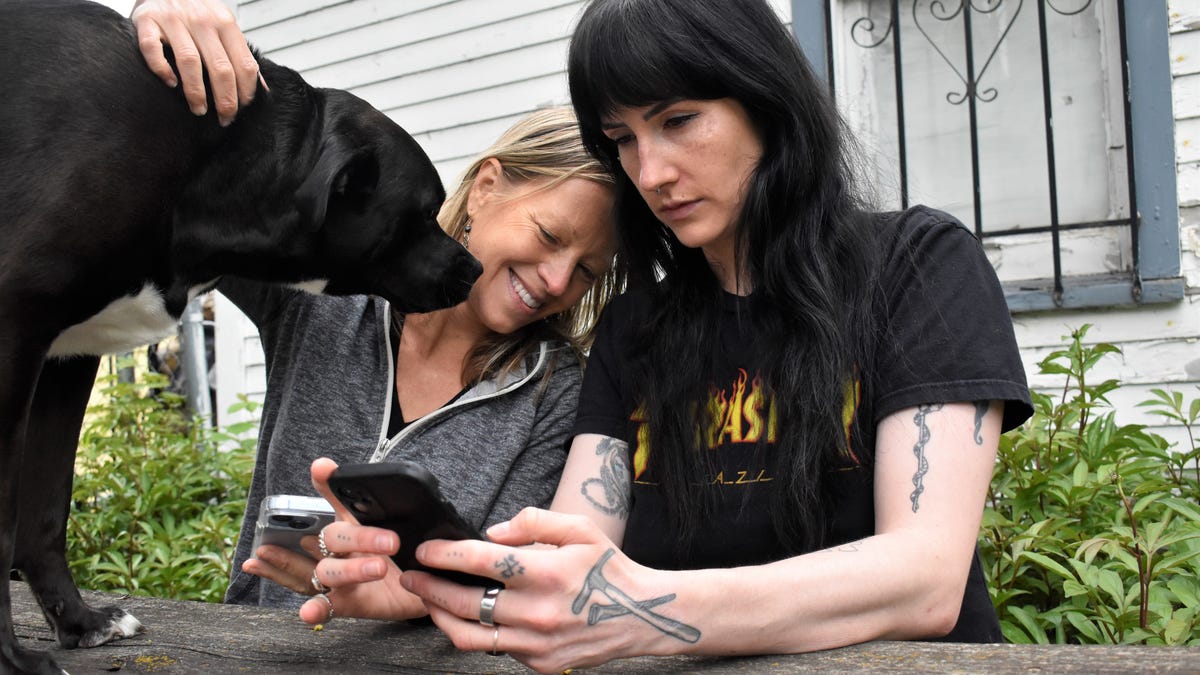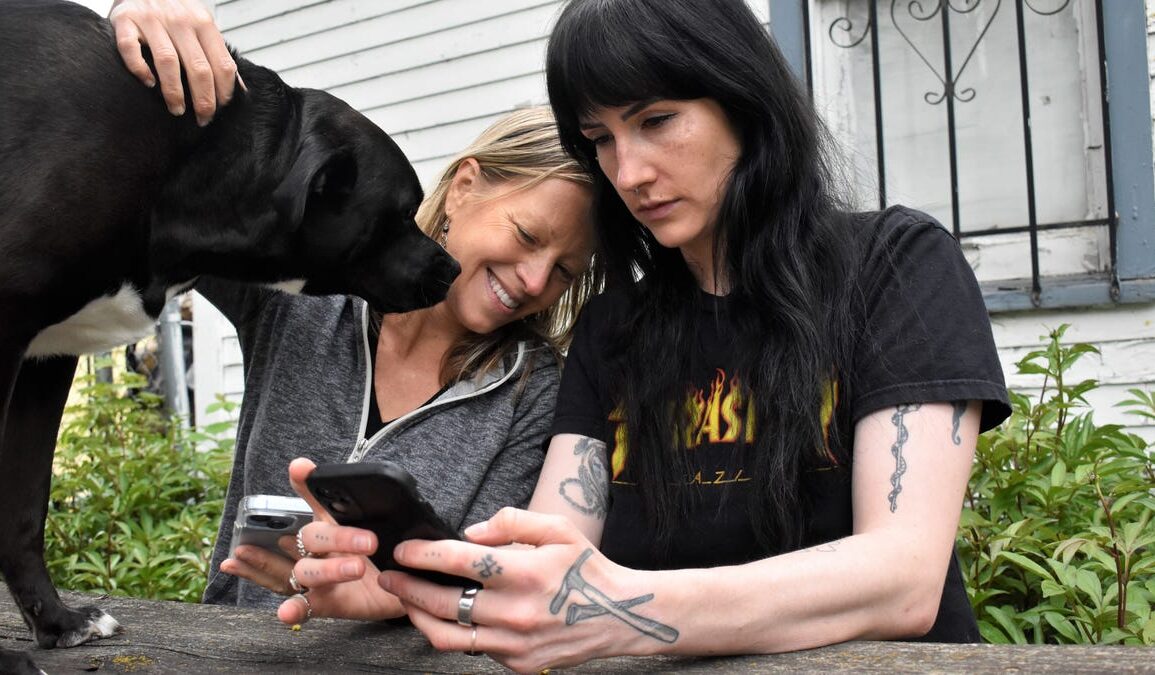
Two puppies were rescued from a hoarding situation in Texas and taken in by a Milwaukee-based dog rescue. Their foster parents believed the dogs — struggling with anxiety from their past — were later sent to a sanctuary in northern Wisconsin for specialized training.
For months, foster parents Samantha Stanfield and Sarah DeSmidt received hopeful updates about the dogs and how they were adapting to the sanctuary’s training programs.
But there was no northern Wisconsin sanctuary. The dogs, named Bill and Marita, had been euthanized.
What happened to Bill and Marita isn’t an isolated tragedy. Instead, advocates and volunteers say, it’s part of a broader pattern, as local animal shelters face overcrowding and volunteer shortages, pushing the care of some animals into smaller, less-equipped rescue groups.
After Public Investigator’s April story about Misfit Mutt Crue MKE revealed a case of dishonesty around a foster dog’s euthanasia, multiple people came forward to share similar stories, including former volunteers with Rescue Gang, the group that took in Bill and Marita.
Their goal, they said, is to shine a light on the lack of regulation and accountability in the rescue world.
“There is very loose regulation on what is required to have a rescue (organization),” said Heather Mishefske, a certified behavior consultant and owner of emBARK, a dog training, grooming and care facility in Eau Claire. “A lot of people that just really want to help dogs may go into rescue not understanding the ramifications and the problems that could potentially arise.”
Mishefske said Bill and Marita’s case isn’t the first time she’s heard of a rescue organization hiding the fact that a dog was euthanized. The pressure of losing the public’s trust and support can lead rescues to hide the truth.
Rescue Gang Director Jennifer Troppmann had similar concerns, according to a February 2024 Facebook message sent to the group’s leadership team where she discusses keeping Bill’s and Marita’s euthanasia quiet.
“I feel icky about it,” she wrote in the message, obtained by Public Investigator. “But the blowback would be awful, and I cannot handle a complete fallout.”
Former foster parents say Rescue Gang sent fake updates, photos of dogs for months
In 2023, with the help of over $1,000 in donations, Rescue Gang took in three puppies from a hoarding situation in Texas. Two of them were Bill and Marita.
Their past left them anxious and reactive, making training difficult. Bill was briefly adopted but returned when he struggled to come out of his shell.
Still, their foster parents — Samantha Stanfield for Bill, and Sarah DeSmidt for Marita — loved them. For four months, they remained committed to helping the dogs, both barely a year old, grow.
So, when Rescue Gang director Jennifer Troppmann told them that in order for the dogs to receive specialized training, they’d stay at the organization’s facility, Stanfield and DeSmidt agreed.
A few days later, Troppmann gave Stanfield and DeSmidt another update — Bill and Marita were on their way to a sanctuary in northern Wisconsin.
“I know it’s hard, but I felt this was their best chance at a happy life,” Troppmann wrote to DeSmidt in a Facebook message viewed by Public Investigator.
Between February and May 2024, Troppmann sent updates on how the dogs were adapting to the sanctuary, including a screenshot of an email supposedly from the sanctuary. The email, viewed by Public Investigator, informed Troppmann that Bill had settled in well and would soon be ready to be transferred to their “adoption program.” Marita needed more time to adapt but was still showing progress, the email said.
But as time passed with only vague updates, both foster parents became suspicious.
DeSmidt repeatedly offered to take Marita back. She asked Troppmann for the name of the sanctuary but never received it. She started calling sanctuaries in an effort to find Marita herself.
Finally, in June, then-acting Rescue Gang director Billee Procknow sent a Facebook message telling the fosters and other volunteers that neither dog had ever gone to a sanctuary and both had been euthanized in February.
Procknow’s message, viewed by Public Investigator, said the dogs’ behavior had regressed and they were becoming a danger to other dogs and humans, which led Rescue Gang to make the “excruciating, but necessary” decision.
“I’m sorry that you are finding out this way, and totally understand if you are upset and angry,” Procknow wrote.
Bill and Marita’s former foster parents, as well as Rescue Gang volunteers who knew the dogs, were devastated and confused, saying neither dog had ever been dangerous in the time they’d fostered them. Both said they would’ve taken them back if they knew the dogs were going to be euthanized.
Complaint records, former volunteer accounts question use of donation funds, fate of other past Rescue Gang dogs
Troppmann told Public Investigator she wasn’t responsible for what happened to Bill and Marita.
Instead, Troppmann said, Rescue Gang’s leadership team took control of the organization while she was on medical leave.
“They took over the rescue,” Troppmann said. “They changed passwords. I had lost complete control of my rescue.”
But a Facebook message viewed by Public Investigator shows Troppmann telling the former Rescue Gang leadership team about the decision to euthanize Bill and Marita in February 2024.
Troppmann, now back from medical leave and working as Rescue Gang’s director again, also told Public Investigator no dogs in her group’s care have been euthanized since.
But through an open records request with the Milwaukee Area Domestic Animal Control Commission, or MADACC, Public Investigator found that a Rescue Gang dog was euthanized in February of this year, about two months before Troppmann spoke to Public Investigator.
The Bill and Marita situation wasn’t the first time Rescue Gang, founded in 2014, was under scrutiny.
According to records obtained through a public records request, the Wisconsin Department of Agriculture, Trade and Consumer Protection has received nine complaints about Rescue Gang since 2017.
Three of those led to formal investigations. In two cases, the department found that the rescue imported dogs without required veterinary documentation, resulting in a $400 fine from the state in 2021.
In 2022, a former foster accused Troppmann of giving out medication without veterinary approval and misrepresenting dogs’ health. DATCP investigated but found no violations.
DATCP spokesperson Molly Mueller said the remaining six complaints were not investigated because they fell outside the agency’s jurisdiction. Those included interpersonal disputes within the rescue and allegations of fabricated fundraising claims and donation misuse.
Similar concerns surfaced in a separate case involving a fundraiser for a dog named Breezy.
An April 2023 Facebook post said Breezy, who’d spent five years in a Texas shelter before being brought to Milwaukee, was facing a possible cancer diagnosis. The post encouraged supporters to donate to Breezy’s “bucket list” and medical care. But former volunteers say Breezy was never formally diagnosed with cancer, and it’s unclear how the fundraiser donations were ultimately used.
Former volunteer Jasmin Elhindi said the dog was timid and used to being alone — then placed in high-stress environments, like a foster home with other dogs, that only heightened her fear.
Elhindi said Breezy was briefly adopted but later returned. After that, it was unclear to her and other Rescue Gang volunteers what happened to Breezy.
Public Investigator learned Breezy was euthanized in August 2024 after filing an open records request for euthanasia cases tied to the name “Jennifer Troppmann.” According to MADACC records, Troppmann brought Breezy in herself, not under Rescue Gang’s name.
Lack of oversight leads to unequipped rescues
Rescue Gang is still operating under Troppmann, but most of its former leadership team, active when Bill and Marita were euthanized, is now running Rey of Hope.
Rey of Hope declined to answer questions about Bill and Marita. In an emailed statement, the nonprofit, founded in 2024, said it is not affiliated with Rescue Gang.
“While members of our community previously volunteered with Rescue Gang, those members were not in positions with decision-making oversight,” the statement said. “Rey of Hope Rescue is committed to building a transparent, community-focused organization.”
Former volunteers told Public Investigator that Rescue Gang’s former trainer, now part of Rey of Hope’s leadership, used outdated methods like shock collars.
Aversive methods like shock collars, especially used on dogs that were saved from traumatic situations, sets them up to fail, said Mishefske, the certified behavior consultant.
Just as anyone can start a small-scale animal rescue, anyone can call themselves a dog trainer, even if they don’t have a license or certification.
And that compounds the problem, Mishefske said. A lack of behavioral support leads to dogs that could’ve been saved being euthanized instead.
Hiring certified behavior professionals can be costly, Mishefske said, though some training resources can be accessed online at low or no cost, through organizations like the International Association of Animal Behavior Consultants, Wisconsin Humane Society, or Every Dog Austin’s free webinars.
“If you’re going to bring dogs in from some of these more traumatic scenarios,” Mishefske said, “you have to provide support.”
Quinn Clark is a Public Investigator reporter for the Milwaukee Journal Sentinel. She can be emailed at QClark@gannett.com.
This post was originally published on this site be sure to check out more of their content.













































